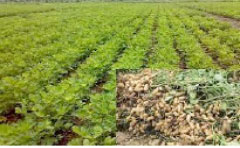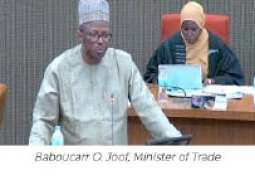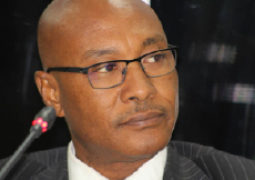
The event held at Genoi was meant to discuss constraints and ways forward for farmers ahead of the groundnut season.
Muhammed Njie, the director-general of Gambia Groundnut Corporation (GGC) explained that “the pre-harvest assessment indicates a bumper harvest, so we expect a lot of groundnut this season. The issue is whether the groundnut will stay in this country and that is the reason we gathered here to discuss so that the groundnut stays in the country. The groundnut sub-sector is important in the economy of this country and if we are able to protect the groundnut in this country, it will surely contribute to the socio-economy of this country.”
He expressed the importance of the convergence, saying it avails them the opportunity to speak to farmers directly on their challenges and way forward. He added that some of their strategies and policies should come from them and that is among the reasons for the dialogue.
On the claims that some recommendations are not implemented at the end of the convergence, he responded that recommendations were implemented sometimes.
“We cannot just give out credit just like that, so we need to protect the resources that we are giving them and by doing so, we have transferred the risk to the financial service providers. It’s not that we don’t want to work with them but we want to protect the public finance.”
Speaking at the event, Dr. Mustapha Ceesay, assistant FAO country rep and head of programmes, said the convergence was important because it involved stakeholders in decision making. He reiterated that the farmers are the most important stakeholders in the groundnut value chain and it makes it possible for them to partake in the decision-making process.
“The most challenging issue in the agricultural sector is the access to inputs and market. If these two are provided, then the farmer will benefit from the sweat of their labour. If farmers are producing and lack the market, they are not encouraged to produce. Access to market will dictate demands and farmers will benefit by having access to sell their goods.”
He said FAO has been very active in the groundnut sub-sector and would continue to work with all stakeholders in the agricultural sector.
Modou Njie, a resident of Fass Omar Saho, expressed farmers’ happiness to grace the event. He said farmers were lacking involvement in such decision-making convergence.
“Our problem is the lack of inputs and market. The market is among the key things we need because we only have market for groundnut and not for other cereals. Factories are needed in the country in order to process our goods and distribute them to the country.”
On the groundnut business, he stated that they are no longer giving their groundnuts as credit to the government, adding that “the government should buy their groundnuts with good price and on time.”
Falalo M. Touray, board chair of GGC also said that the board will address the demands of the farmers. He explained that there were issues raised about the policies but that is beyond the powers of the board.
“The board will discuss the matter and refer it to the superiors in order to resolve it. The price of groundnut is also beyond the mandate of the board and I have clearly informed farmers about that. The committee of pricing is set up from different ministries and they looked on several issues before fixing a price that is based on national interest.”
Read Other Articles In Headlines




